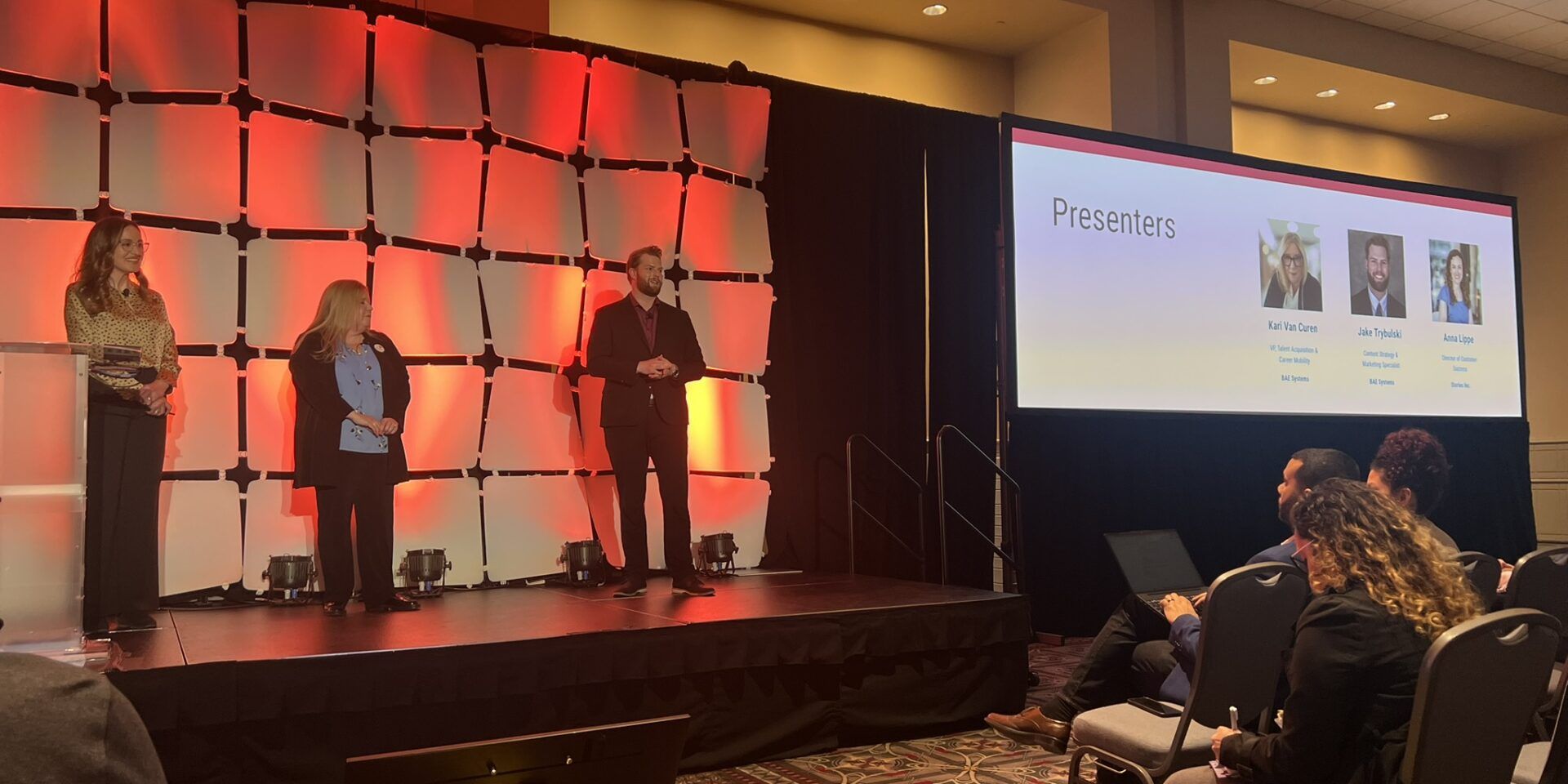IAMPHENOM 2025 Recap: Using AI to Power Human Connection
Last week, alongside 2,000+ talent professionals, the Stories Inc. team attended IAMPHENOM in Philadelphia. As we sat in a packed auditorium, captivated by Phenom’s latest AI-driven innovations, we noticed something remarkable—no one could look away. From automated interview scheduling to AI-powered fraud detection, all eyes were glued to the latest product innovations.
It was clear: AI is getting us “out of the Stone Age” and transforming how we attract and retain talent. But as Phenom Co-founder & CEO Mahe Bayireddi reminded us, AI isn’t the enemy. The real challenge is that business strategy moves faster than HR can keep up.
AI’s greatest promise is to free us from the mundane so we can focus on what matters most—helping people find meaningful work, at scale.
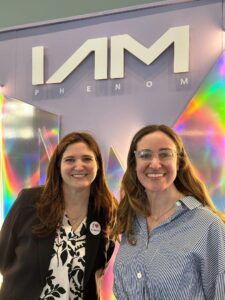
The Power of Human Connection
At IAMPHENOM, it wasn’t just the technology that made an impact. The most talked-about and memorable moments were human stories. Even a main stage session billed as a discussion on the future of AI discussion evolved into a conversation about the types of emotional and mental support leaders need to be the best they can be.
This blend of AI-driven efficiency and human-centric storytelling sets the stage for employer branding to shine. Breakout sessions showcased how Phenom’s capabilities, when paired with compelling, employee story content, elevate recruitment marketing and employer branding efforts.
The key takeaway: the future of talent isn’t just about AI—it’s about using AI to create more and more human, authentic connections. And that theme showed up time and again throughout the conference.
Here are some of the most powerful human moments we took away from IAMPHENOM.
Simone Biles: Prioritizing Mental Health is a Strength
Olympic champion Simone Biles shared both triumphs and struggles, highlighting the unseen challenges of mental health in high-performance environments. She spoke candidly about experiencing the “twisties” and how, unlike physical injuries, mental health struggles aren’t always visible. She even joked that she should have worn a helmet so people knew where her injury resided!
Biles was proud that stepping back from competition helped normalize the conversation around mental well-being in athletics and beyond. Just as you seek expert guidance in your craft, you should also seek professional support for your mental health.
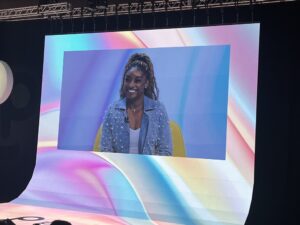
Wawa CEO Chris Gheysens: Lead with Culture
At Wawa, hiring the right leaders isn’t just about business acumen—it’s about extending and shaping culture. Hiring the right leaders are so important that CEO Chris Gheysens acknowledges it takes a lot of time. His approach reminded us of the old adage of hiring slow and firing fast.
One way they assess leadership for culture fit is to bring executive candidates into Wawa stores to observe how they interact with employees. If a leader can’t connect with store associates, they likely will not be the right fit.
That strong connection between leadership and store colleagues is what makes Wawa special. Gheysens shared a story about grabbing a coffee on his way to the office. Instead of the usual branded sleeve, his cup featured a hand-drawn Wawa logo from a local student. When he asked about it, the store manager reminded him that Wawa partners with area schools to design coffee sleeves with uplifting messages—a small initiative that perfectly reflects Wawa’s people-first culture.
For Wawa, leadership isn’t just about overseeing operations. It’s about embracing and enhancing the culture that frontline employees bring to life every day.
Stories Inc. and BAE Systems: Transforming the Full Talent Lifecycle with Storytelling
“AI can’t replace branding your company with authentic stories of your people.”
That was the truth bomb from Jake Trybulski, Content Strategy & Marketing Specialist at BAE Systems, that earned thunderous applause during our session.
Joined by Stories Inc.’s Anna Lippe and Kari Van Curen, Vice President of Talent Acquisition at BAE Systems, the session explored how real employee storytelling is transforming BAE Systems’ talent lifecycle—creating a seamless employer brand experience for candidates, employees, and alumni alike.
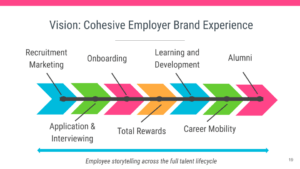
After creating a library of employee story videos to activate BAE System’s new employer brand across candidate-facing and internal channels, the team shared one of their favorite employee stories with the audience. Watch the video and access other videos from the employee story library in the video playlist below.
Key takeaways from the session:
- Authenticity wins—your employees’ voices are your employer brand’s most powerful asset.
- Storytelling fuels more than just hiring—it enhances the employee experience and strengthens leadership engagement.
- Internal alignment is key—bringing HR, Comms, and other stakeholders into the process ensures fewer roadblocks and greater impact.
At a time when AI is streamlining processes, BAE Systems is proving that real human stories remain the heartbeat of employer branding and connecting people to purpose at every stage of their journey.
Rachel Duran & HPE: Elevating the Career Site Experience
Rachel Duran, Head of Global Employer Brand and Recruitment Marketing at HPE, unveiled HPE’s newly rebranded career site. In a window into a fast moving project, Rachel shared newly created pages and their early successes, knowing they were still building out some of the site. To accomplish a lot in a short period of time, she relied on building relationships across her company including HPE’s marketing team as well as their RPO partner. She shared actionable strategies for building strong relationships across teams at work, aligned to a common goal.
Heather Leszczewicz & Conagra: The Recipe for a High-Impact Career Site
Heather Leszczewicz, Recruitment Marketing Manager at Conagra Brands, shared the “fresh ingredients” for a winning career site, inspired by the food company’s compelling transformation.
- AI-powered job discovery for a personalized candidate experience
- Authentic employee testimonials to showcase real voices and bring culture to life
- Location-based personalization to deliver relevant content
By using AI to enhance job discovery and personalization, Heather successfully created opportunities to deliver tailored, human-centric experiences to candidates—a strategy that is already turning passive job seekers into engaged applicants.
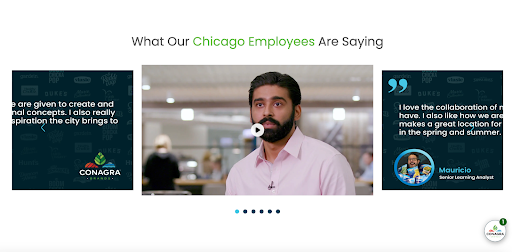
Michaels Team: Bringing Employer Brand to Life with Design
Amanda Medina, Employer Brand Manager, and Edwin Avila, Director of HRIS, tackled a major challenge: making Michaels’ candidate journey more engaging and accessible. Their previous career site lacked brand identity, leading to high drop-off rates.
Their solution was a vibrant redesign featuring real employees and dynamic photography—creating an experience that reflects Michaels’ creative, inclusive culture.
In just one month, they saw a significant boost in candidate engagement and conversions.
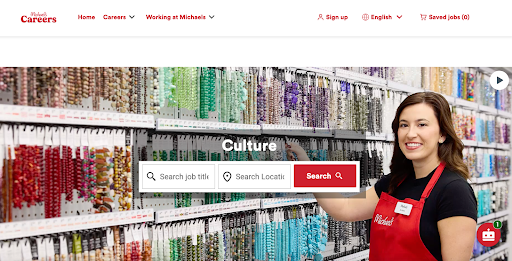
Thanks for a great week, IAMPHENOM!
AI is transforming the way we attract and retain talent. But if IAMPHENOM showed us anything, it’s that human stories and experiences still drive connection.
From leadership lessons to career site innovations, this year’s event proved that the future of talent isn’t about replacing people with technology—it’s about using technology to enhance and amplify the human experience.
Want more insights like this post? Subscribe to our newsletter to receive employee storytelling insights and best practices every other Wednesday.

